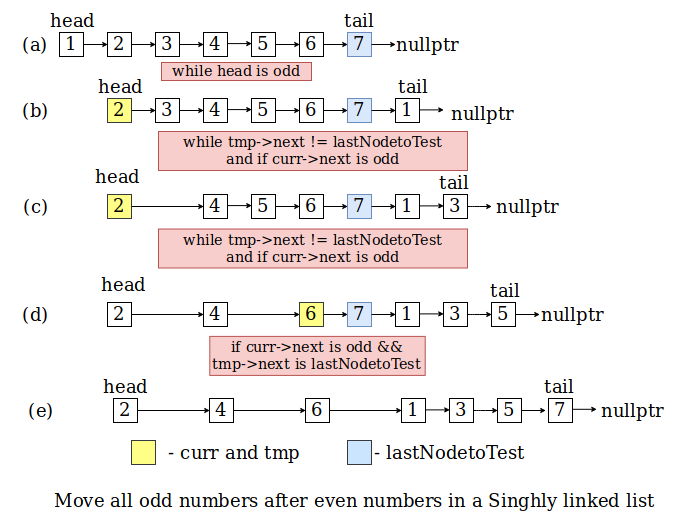Move all Odd numbers after Even numbers in Singly Linked List | C++ Implementation
Given a Singly Linked List, we have to modify it such that all Even numbers appear before Odd numbers.
For eg.
Given Linked List : 1, 2, 3, 4, 5, 6, 7
After Modification : 2, 4, 6, 1, 3, 5, 7

From the above fig. we can see that how the function will work.
While the head of the list is odd, the head is copied to an auxiliary node and element next to the head will become new head. The auxiliary node is added after tail and tail is updated. Similarly all odd value nodes are removed from their position and added after the tail of the list.
Here is the advance, getLastNode, isOdd and exchangeEvenOdd function.
static void advance(Node*& node)
{
assert (node != nullptr);
node = node->next;
}
Using this function node advances to next node.
Node* getLastNode()
{
Node *node = head;
while (node->next != nullptr)
node = node->next;
return node;
}
This function returns the last node of the linked list.
bool isOdd(int num)
{
if (num % 2 != 0)
return true;
else
return false;
}
This function checks whether the entered value is odd or even.
void exchangeEvenOdd()
{
Node *node = nullptr;
Node *lastNodeToTest = getLastNode();
Node *tail = lastNodeToTest;
while (isOdd(head->data) == true)
{
node = head;
advance(head);
tail->next = node;
advance(tail);
}
Node *tmp = head;
Node *curr = head;
while (tmp->next != lastNodeToTest)
{
if (isOdd(curr->next->data) == true)
{
node = curr->next;
curr->next = node->next;
tail->next = node;
advance(tail);
}
else
{
//advance "curr" and "tmp" only when next node to it is even
advance(curr);
advance(tmp);
}
}
if (isOdd(curr->next->data) == true && tmp->next == lastNodeToTest)
{
node = lastNodeToTest;
curr->next = lastNodeToTest->next;
tail->next = lastNodeToTest;
advance(tail);
}
tail->next = nullptr;
lastNodeToTest = nullptr;
node = nullptr;
}
#include <iostream>
#include <utility>
#include <cassert>
class LinkedList
{
struct Node
{
int data;
Node * next = nullptr;
Node(int value) : data(std::move(value)), next(nullptr) {}
};
Node *head;
public:
LinkedList() : head(nullptr) {}
~LinkedList()
{
Node *tmp = nullptr;
while (head)
{
tmp = head;
head = head->next;
delete tmp;
}
head = nullptr;
}
void insert(int);
void exchangeEvenOdd();
void printList() const;
private:
static void advance(Node*& node)
{
assert (node != nullptr);
node = node->next;
}
Node* getLastNode()
{
Node *node = head;
while (node->next != nullptr)
node = node->next;
return node;
}
bool isOdd(int num)
{
if (num % 2 != 0)
return true;
else
return false;
}
};
void LinkedList::insert(int value)
{
Node *node = new Node(std::move(value));
Node *tmp = head;
if (tmp == nullptr)
{
head = node;
}
else
{
tmp = getLastNode();
tmp->next = node;
}
}
void LinkedList::exchangeEvenOdd()
{
Node *node = nullptr;
Node *lastNodeToTest = getLastNode();
Node *tail = lastNodeToTest;
while (isOdd(head->data) == true)
{
node = head;
advance(head);
tail->next = node;
advance(tail);
}
Node *tmp = head;
Node *curr = head;
while (tmp->next != lastNodeToTest)
{
if (isOdd(curr->next->data) == true)
{
node = curr->next;
curr->next = node->next;
tail->next = node;
advance(tail);
}
else
{
//advance "curr" and "tmp" only when next node to it is even
advance(curr);
advance(tmp);
}
}
if (isOdd(curr->next->data) == true && tmp->next == lastNodeToTest)
{
node = lastNodeToTest;
curr->next = lastNodeToTest->next;
tail->next = lastNodeToTest;
advance(tail);
}
tail->next = nullptr;
lastNodeToTest = nullptr;
node = nullptr;
}
void LinkedList::printList() const
{
if (head == nullptr)
{
std::cout << "Empty List \n";
return;
}
Node *node = head;
while (node != nullptr)
{
std::cout << node->data << " ";
advance(node);
}
std::cout << "\n";
}
int main()
{
LinkedList ll1;
ll1.insert(1);
ll1.insert(2);
ll1.insert(3);
ll1.insert(4);
ll1.insert(5);
ll1.insert(6);
ll1.insert(7);
std::cout << "Original List : ";
ll1.printList();
ll1.exchangeEvenOdd();
std::cout << "New List : ";
ll1.printList();
}
View this code on Github
Reference: Introduction to Algorithms The Algorithm Design Manual Data Structures and Algorithms Made Easy